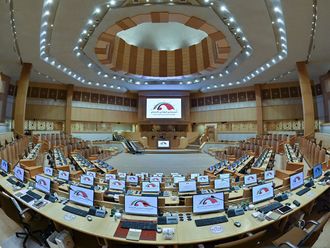
Dubai: The sudden shift to distance learning and work from home forced by the COVID-19 pandemic has turned the focus on science and technology for students, universities and employers, UAE-based education experts said on International Day of Education today.
Tech degrees and jobs in data science, artificial intelligence (AI), cybersecurity and related fields have seen a surge in demand, the experts said, noting universities themselves have had to enhance their online teaching to cope with the pandemic, which had closed campuses. The rise in online degrees and distance teaching has also increased the need for quality control and accreditation systems.
The insights come as the third International Day of Education (first declared by the United Nations in 2018) is being held this year under the theme ‘Recover and Revitalise Education for the COVID-19 Generation’.
‘Agility is crucial’
The availability of “future-focused” courses in Dubai that meet the need of the hour will attract university students from the UAE and abroad, said Mohammad Abdullah, managing director of Dubai International Academic City and Dubai Knowledge Park. He added: “From distance learning to virtual graduations, academia has embraced tremendous change to maintain the highest standards of education and prepare students for a rapidly changing labour market. Such agility is crucial to provide learning experiences that meet the needs of more than 27,000 students across our two knowledge-focused districts ... With some of our business partners offering future-focused courses in artificial intelligence, cybersecurity, gaming and robotics, local and international students see Dubai as an attractive destination for higher education.”
The past year drastically altered the job market, with employers seeking fresh talent to support tech-related operations as the world moved towards a “hybrid workplace” in many spheres — including in education, said Andy Phillips, Chief Operating Officer, University of Wollongong in Dubai.
“The COVID-19 pandemic has certainly transformed the educational landscape and the way educational institutions operate. As the world adopts a more globalised approach to higher education, many universities will need to overcome the challenge of integrating technology into their operations to ensure that both teaching and learning are seamless and uninterrupted,” Phillips added.
In-demand degrees
“Our students can expect to graduate into a very different job market from 12 months ago where employers and governments have refocused their requirements for young graduates. We have seen an increase in demand for degrees that support career paths in thriving STEM sectors such as cyber security, big data, gaming and mobile development, and data analytics, to name a few.”
Dr Cedwyn Fernandes, pro-vice chancellor of Middlesex University Dubai also mentioned an uptick in interest in courses for data analysis, IT, robotics, digital marketing, among others, to suit the near-future job market. He added that the ability of universities to balance between online and in-person learning will be pivotal in 2021. “Pure online degrees have always existed internationally and due to the circumstances [in 2020] became popular. However, there is no substitute for an on-campus student experience and this will continue to be a key factor for universities going forward.”
Students under stress
The disruptions have also turned the spotlight on another crucial aspect — the mental health of students globally, said Professor Ammar Kaka, provost and vice-principal, Heriot-Watt University Dubai. “There is now additional focus on ensuring student wellbeing. The sudden transition to online learning and reduced offline interactions with peers has resulted in the rise of several mental health challenges such as anxiety, stress, and depression amongst students all over the world.”
At Heriot-Watt University, students have online access to ‘Student Wellbeing Advisors’ — a team of “trained professionals who are accredited by relevant professional bodies and are qualified to provide emotional support and guidance” to students, Prof Kaka added.
Degrees not enough
With an “employment crisis” spawned by the pandemic in 2020, this year the job market has become especially competitive, Prof Kaka said. “Employers are becoming more demanding and sophisticated in how they assess candidates. Having a degree qualification or a number of years of experience may no longer get you an interview, let alone a job. Employers increasingly assessing candidates for how they have or would cope with disruptions in challenging times and how they would push boundaries in prosperous times.”
Students at risk
With many youth facing unemployment and lack of funds for university in the Arab world, ensuring education and jobs in a post-pandemic world is today more urgent than ever, said Dr Sonia Ben Jaafar, CEO, Abdulla Al Ghurair Foundation for Education, which provides scholarships for underserved students. “Our mission is to elevate Arab youth’s livelihoods through quality education so that we may contribute to the region’s sustainable development. We are focused on ensuring more youth have access to quality education in the post-pandemic world,” Dr Ben Jaafar said.
Leveraging online tools
“Recently, we partnered with the Ministry of Education to form the University Consortium for Quality Online Learning, making online learning programmes more available to a larger pool of underserved students from the UAE and abroad. By bringing about institutional change at the university level through the UCQOL, key stakeholders in the online education realm will be equipped with the technological expertise to design, develop and deliver high-quality online programs, ultimately benefiting the students, and helping them to excel throughout their learning,” she added.













